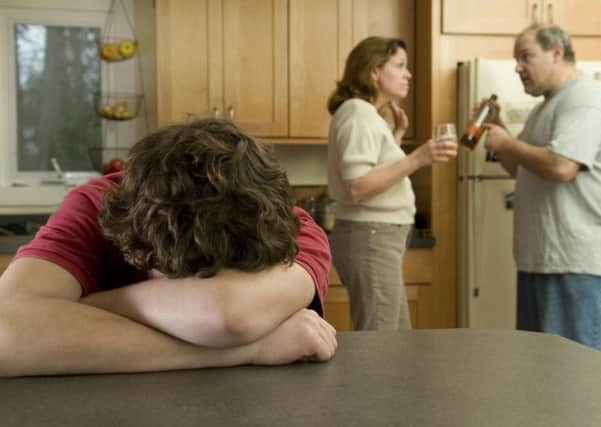Don’t let children suffer in silence


SOPHIE is eight years old and lives with her mum and dad in Edinburgh. Her dad drinks heavily and his drinking is causing arguments between her mum and dad. Sophie is worried that her parents are going to split up.
Sophie misses spending time with her dad. He doesn’t take her swimming at weekends any more and her mum says she’s not allowed to have friends over to play. Sophie is often late for school because her dad is hungover and her mum works early shifts.
Advertisement
Hide AdAdvertisement
Hide AdShe’d like to talk to someone about what’s happening at home but none of her teachers knows and her mum said that some things are best kept within the family and that her dad would be angry if people found out.
Sadly, Sophie’s story is not unusual. New figures released by Childline reveal that the number of children contacting it because they are worried about their parents’ drinking or drug use has more than doubled in the last year. ChildLine carried out 5,323 counselling sessions with children affected by their parents’ drinking or drug use in 2012/13. Most of the children who called the helpline were aged between 12 and 15 years old, although one in ten was of primary school age.
In Scotland, it is estimated that more than 50,000 children are living with a parent who has an alcohol problem and in the UK, one in three children lives with at least one binge drinking parent.
Services like ChildLine have an important role to play in providing support to children who are suffering as a result of harmful parental drinking. However, it should be recognised that the calls they receive are likely to represent the tip of the iceberg.
Every family is different, but children who live with someone who drinks too much often say they feel scared, confused, stressed and worried when their parent is drinking.
To help children and adults to better understand the situation that children like Sophie find themselves in, Alcohol Focus Scotland has developed the Rory training resource pack which has been delivered to teachers and other practitioners across Scotland.
Rory tells the story of a dog called Rory and the downturn in his life when his owner starts to drink heavily. At the start of the story, Rory is happy, well groomed and well fed but as the situation worsens, he begins to feel neglected and lonely. Rory is confused and upset by his owner’s unpredictable behaviour. At first, he suffers in silence and blames himself for the problem, but his life improves when he confides in a trusted adult dog who helps Rory to understand that the situation is not his fault and that his owner needs to seek help for his drinking.
Many teachers have told us that they are apprehensive about raising the issue of harmful drinking for fear of “opening a can of worms”. Rory tackles an emotive and difficult subject in a sensitive way. Practitioners using the resource have said that it has helped them to feel more confident in talking about alcohol harm and in supporting children who are affected by a family member’s drinking.
Advertisement
Hide AdAdvertisement
Hide AdA practitioner working in Midlothian told us: “I am working with a wee boy just now. When we watched the Rory film together, he said “that’s just like me”. I have used all the Rory resources with him and can honestly say that Rory has changed this little boy’s life.”
For children who aren’t affected and don’t recognise of Rory’s experiences, the story helps them feel empathy and to be more understanding towards children who have a difficult home life. And adults seeing the film and reading the book gain a better understanding of the impact of parental drinking from a child’s point of view.
Of course, children living with problem parental drinking are best helped if the parent is able to receive effective treatment and is supported to drink less or to stop drinking altogether. But this can be a difficult, stressful time for the family and it is made all the more difficult by the cheap prices, widespread availability and aggressive marketing of alcohol. Imagine how difficult it is for people trying to recover from alcohol dependence or who are simply trying to drink less to succeed when they are surrounded by alcohol both in their physical environment and in their social life.
So for children like Sophie, who are late for school or whose mood and behaviour has changed, take time to ask the question – what’s going on at home that’s affecting this child and how can we help them to feel happy, healthy and secure?
And the next time you hear someone complaining about the “nanny state” or the right of individuals to drink as they see fit, spare a thought for the people around the drinker. In particular, consider whether our children and young people have the right to grow up in an environment that protects them from the harm that alcohol causes.
• Dr Evelyn Gillan is chief executive of Alcohol Focus Scotland
SEE ALSO